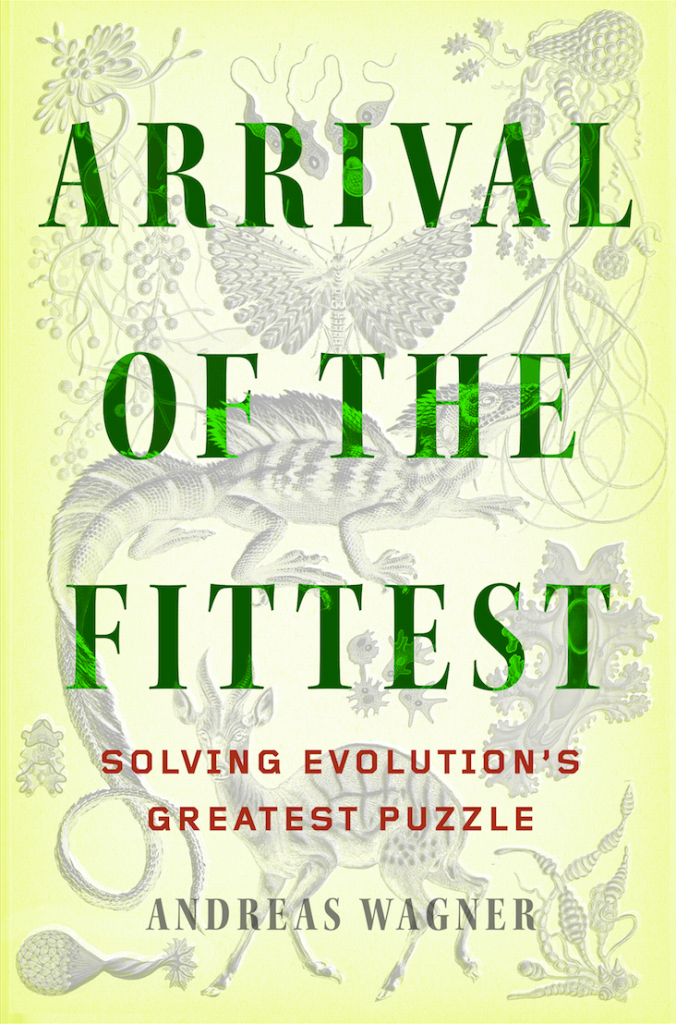
The phrase “arrival of the fittest” is seen and heard from time to time, often contraposed with the phrase “survival of the fittest” (due to Herbert Spencer, but adopted by Darwin in the fifth and sixth editions of the Origin). Typically it is used in making the claim that natural selection cannot by itself account for evolution because selection must have variation upon which to act. Thus natural selection (it is claimed) explains the survival but not the arrival of the fittest. The rhyme between “arrival” and “survival” is catchy, and it’s not surprising that Google Scholar lists almost six hundred articles containing the phrase “arrival of the fittest,” with eighteen articles containing it in their title. There are also at least three books with the phrase in their title, of which the most recent is Arrival of the Fittest: Solving Evolution’s Greatest Puzzle (2014), by Andreas Wagner.
In the text of his book, after inventorying a vast range of variation in the ways in which living things have adapted, Wagner writes, “Selection did not—cannot—create all this variation. A few decades after Darwin, Hugo de Vries expressed it best when he said that ‘natural selection may explain the survival of the fittest, but it cannot explain the arrival of the fittest’ (emphasis added). And if we do not know what explains its arrival, then we do not understand the very origins of life’s diversity.” De Vries (1848–1935) was a Dutch botanist, a pioneer of genetics, and (along with Carl Correns and Erich von Tschermak) one of the rediscoverers of Mendel’s work. Wagner is quoting the conclusion of de Vries’s Species and Varieties: Their Origin by Mutation, based on lectures that he delivered in 1904 at the University of California, Berkeley.
The story isn’t quite so simple, though, as Wagner acknowledges in a footnote: “de Vries does not claim to be the original of this statement, but attributes it to Arthur Harris without further reference.” Well, not quite: de Vries precedes the statement with, “Or, to put it in a term chosen lately by Mr. Arthur Harris in a friendly criticism of my views,” which at least hints at the source. Wagner was evidently able to find it, as was I, in a review by J. Arthur Harris, Ph.D.—so not Mr. but Dr. Harris, if we’re going to be picky!—of de Vries’s Die Mutationstheorie: Versuche und Beobachtungen über die Entstehung von Arten im Pflanzenreich (The Mutation Theory: Experiments and Observations on the Origin of Species in the Vegetable Kingdom, 1901–1903), published in the April 1904 issue of The Open Court.
James Arthur Harris (1880–1930) was a botanist who worked at the Carnegie Institution and the University of Minnesota; his colleagues published a volume in his memory (J. Arthur Harris: Botanist and Biometrician) in 1936, although he may be remembered less fondly by those on a diet—Harris coauthored A Biometric Study of Basal Metabolism in Man (1919), which provided equations to estimate daily kilocalorie requirements. But it’s not necessary to dwell further on Harris, because—as Wagner notes—in his review of de Vries’s book, Harris “declares it a quote but does not provide the source.” Actually, Harris didn’t quite go so far as to declare it a verbatim quote. He wrote, “I think I have the quotation not far from correctly stated: ‘Natural selection may explain the survival of the fittest but it cannot explain the arrival of the fittest.’”
Harris wasn’t far off. Whether he knew it or not, he was quoting from Jacob Gould Schurman (1854–1942). Born in Canada, Schurman earned his B.A. and M.A. from the University of London and his D.Sc. from the University of Edinburgh, after which he taught at Acadia College, Dalhousie College, and Cornell University, where he was a professor of Christian ethics and moral philosophy. He served as Cornell’s president from 1892 to 1920; the university remarks, “Schurman’s administration also saw the transformation of the American university from a teaching institution to a research establishment in which teaching is done.” After retiring from Cornell, he served as the United States minister to China and then ambassador to Germany. His books included The Ethical Import of Darwinism (1887), Belief in God: Its Origin, Nature, and Basis (1890), and Agnosticism and Religion (1896).
The object of The Ethical Import of Darwinism, Schurman wrote, “is to distinguish between science and speculation in the application of Darwinism to morals.” In so doing, of course, it was necessary for Schurman to sketch his understanding of evolution and of Darwinism (sensu the primacy of natural selection in evolution). A few pages after doing so, he wrote, “The survival of the fittest, I repeat, does not explain the arrival of the fittest.” He wasn’t literally repeating himself; that’s the first instance of the slogan in the book. But he articulated the same thought in the previous paragraph: “natural selection, or survival of the fittest, can accomplish nothing until it is supplied with material for ‘selection,’ until there has appeared upon the field an antecedent ‘fittest’—a fittest organ, function, habit, instinct, constitution, or entire organism.”
Schurman liked the phrase enough to repeat it almost verbatim in Agnosticism and Religion: “But pray observe,” he entreated his reader, “that the survival of the fittest does not account for the arrival of the fittest” (emphasis in original). Both versions—the earlier version with “explain” and the later version with “account for”—appear, with due credit to Schurman, in various theological writings around the turn of the nineteenth century, including in volume 2 of A. H. Strong’s influential Systematic Theology (revised edition, 1907), but by the time of the First World War his connection with the phrase seems to have been largely forgotten. Interestingly, though, a short story published in Scribner’s in 1909 features a biologist named Galen Dredge and his book The Arrival of the Fittest. Was it a coincidence, or was Schurman being read by Edith Wharton?

